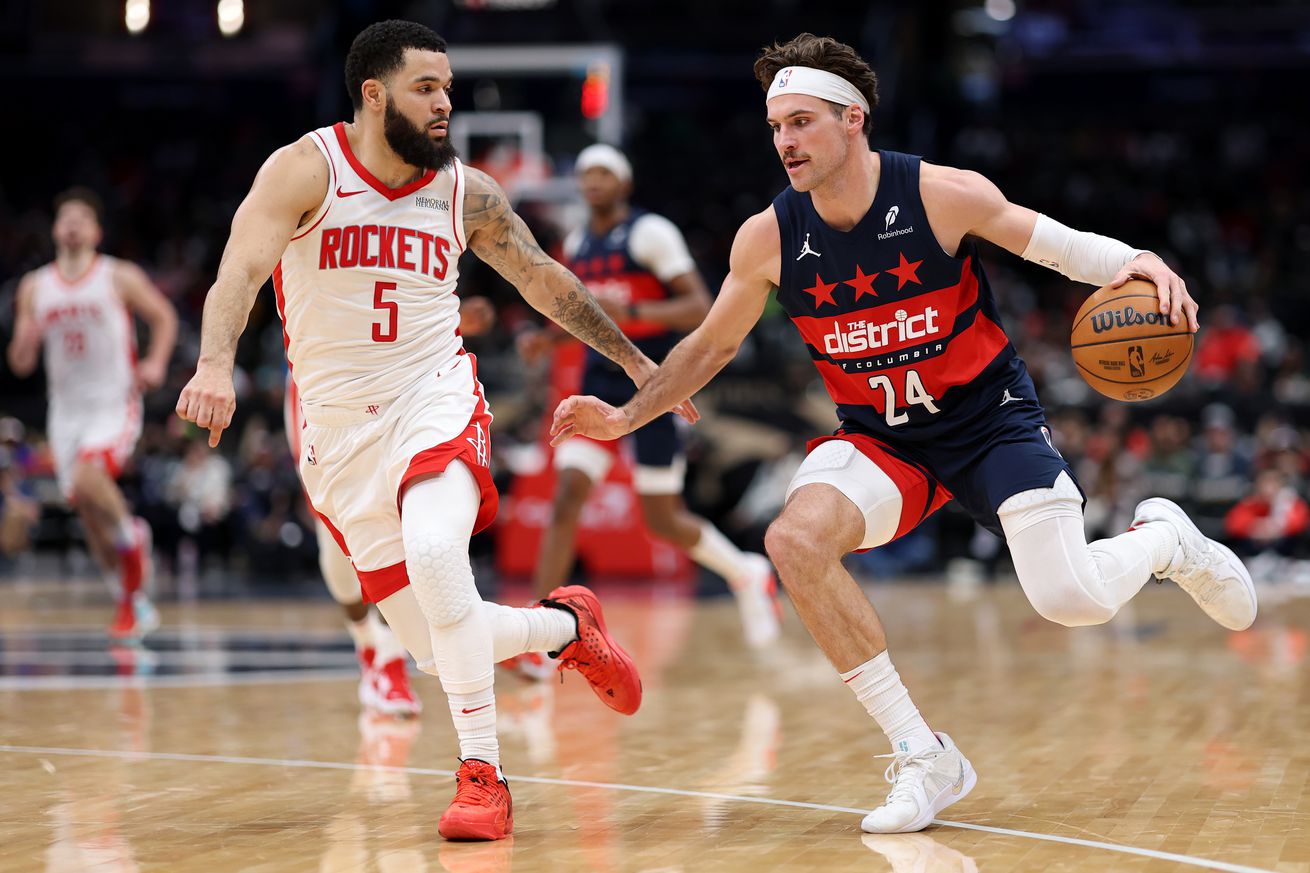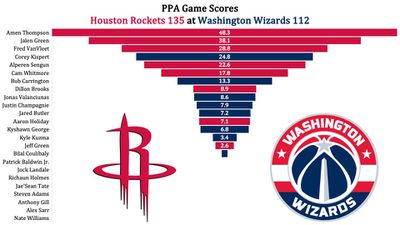
Stats, commentary, analysis.
In the first quarter, the Houston Rockets shot like the worst shooting team in the NBA (which they were entering the game), and the period ended with the Washington Wizards leading, 30-20. And then the Rockets shot like they were facing one of the league’s worst defenses and outscored 115-82 over the remaining three quarters and coasted to a comfortable 135-112 victory.
To put some numbers on this, Houston shot 7-24 from the floor over the first 12 minutes. That’s 29.2%. That included two three-pointers, which boosted their effective field goal percentage to 33.3%. Over the final 36 minutes, they connected on 43-73 from the floor (58.9%), and 13-29 from three. That’s an eFG% of 67.8%.
What’s kinda impressive is that the Wizards didn’t play particularly badly, at least on offense. They shot pretty well (54.5% eFG%), hit 15-40 from three (37.5%) and grabbed 16 offensive rebounds against one of the NBA’s better defensive rebounding teams. They just got trucked by a vastly superior opponent that hit an array of open and contested shots over the final three quarters.
Bright spots?
- Bub Carrington had 12 points, 4 rebounds, 5 assists, and zero turnovers. It was a low usage (10.8%) hyper-efficient game (172 offensive rating) for the 19-year-old. He was ineffective on defense, which was true of all his teammates.
- Corey Kispert made shots — 7-10 from the floor and 5-7 from deep. He also contributed four rebounds and three assists in 33 minutes.
- Jonas Valanciunas had an entertaining mano-a-mano battle with Rockets center Alperen Sengun (a player selected one pick after then-GM Tommy Sheppard chose Kispert, just sayin’). Sengun definitely won the matchup overall (26 points, 10 rebounds, 6 assists, 2 steals) after an abysmal start. Valanciunas scored 18 points and had 4 rebounds in just 22 minutes of action.
- Justin Champagnie started the second half after Kyle Kuzma was sidelined with what the team called a calf contusion, and he performed adequately in classic role player style — 7 points, 5 rebounds, a steal and a block. He finished with a 172 offensive rating on 9.8% usage.
- Jared Butler did competent backup guard things — 14 points, 5 assists, a steal and a block. I’d like to see him cut down the turnovers. He had three last night, which is too many.
- Bilal Coulibaly had some good moments, especially when he penetrated aggressively. He scored 12 points on 10 shots and grabbed 5 rebounds, all of which was fine. Not fine was the 4 turnovers vs. 1 assist.
- For the Rockets, Amen Thompson played a helluva game — 20 points and a 216 offensive rating on 12.0% usage. He added 15 rebounds, 5 assists, 3 steals, and zero turnovers, plus a passel of eye-popping athletic plays. On one trip to the rim, it looked for all the world like he was executing a gliding finger-roll layup (the exact kind I’ve seen thousands of times over the years), and he instead turned it into a windmill power dunk. Amazing play.
- After a rough start, Jalen Green hit everything to finish with 29 points on positive efficiency.
- Fred VanVleet had 19 points, 12 rebounds, 4 steals and a block in a classic steady-as-she-goes veteran point guard kind of game.
- Old man Jeff Green got up for one of his patented where the hell did that come from?! dunks.
A few things that amused me:
- During a rare appearance, Washington center Richaun Holmes seemed to forget how to handle a lob. Instead of dunking, he brought the ball down and tossed up an awkward shot that had little chance of going in.
- On Playback, I talked in the opening minutes about Dillon Brooks’ penchant for fouling so much that it undermines his defensive contributions. Brooks quickly got into foul trouble and ended the night with four fouls in 18 minutes.
- Cam Whitmore scored 17 points on 6-8 shooting, which was impressive. He grabbed one rebound in 18 minutes and had zero assists. I assume he threw a pass at some point during the game, though I don’t remember one.
Last thing: the Rockets were the NBA’s top offensive rebounding team. The Wizards are 28th in defensive rebounding. Houston finished the night with 19 offensive boards, which is staggering considering how well they shot. They ended up with a 41.3% offensive rebounding percentage. That was Washington’s worst defensive rebounding performance of the season, surpassing the 39.5% offensive rebounding percentage they allowed when they lost to the Houston Rockets on Nov. 11.
For the Rockets, it’s their third best offensive rebounding percentage of the season so far. They collected 44.2% in beating the Memphis Grizzlies on Oct. 25, and 42.9% in a loss at the Sacramento Kings on Dec. 3.
Four Factors
Below are the four factors that decide wins and losses in basketball — shooting (efg), rebounding (offensive rebounds), ball handling (turnovers), fouling (free throws made).
Stats & Metrics
Below are a few performance metrics, including the Player Production Average (PPA) Game Score. PPA is my overall production metric, which credits players for things they do that help a team win (scoring, rebounding, playmaking, defending) and dings them for things that hurt (missed shots, turnovers, bad defense, fouls).
Game Score (GmSC) converts individual production into points on the scoreboard. The scale is the same as points and reflects each player’s total contributions for the game. The lowest possible GmSC is zero.
PPA is a per possession metric designed for larger data sets. In small sample sizes, the numbers can get weird. In PPA, 100 is average, higher is better and replacement level is 45. For a single game, replacement level isn’t much use, and I reiterate the caution about small samples sometimes producing weird results.
POSS is the number of possessions each player was on the floor in this game.
ORTG = offensive rating, which is points produced per individual possessions x 100. League average last season was 114.8. Points produced is not the same as points scored. It includes the value of assists and offensive rebounds, as well as sharing credit when receiving an assist.
USG = offensive usage rate. Average is 20%.
ORTG and USG are versions of stats created by former Wizards assistant coach Dean Oliver and modified by me. ORTG is an efficiency measure that accounts for the value of shooting, offensive rebounds, assists and turnovers. USG includes shooting from the floor and free throw line, offensive rebounds, assists and turnovers.
+PTS = “Plus Points” is a measure of the points gained or lost by each player based on their efficiency in this game compared to league average efficiency on the same number of possessions. A player with an offensive rating (points produced per possession x 100) of 100 who uses 20 possessions would produce 20 points. If the league average efficiency is 114, the league — on average — would produced 22.8 points in the same 20 possessions. So, the player in this hypothetical would have a +PTS score of -2.8.

by Kevin Broom
